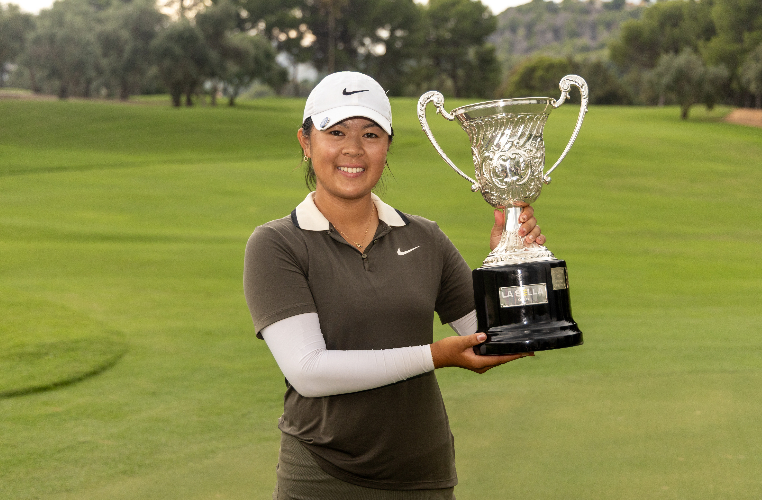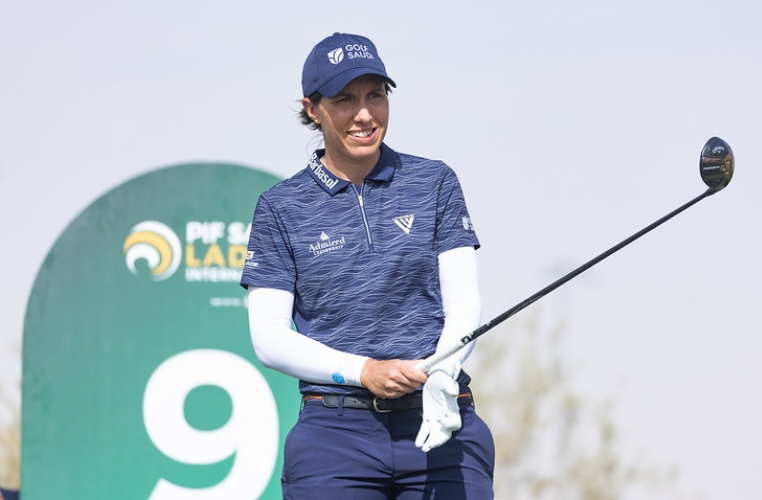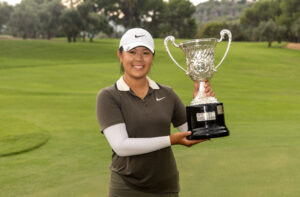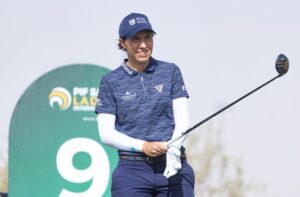By Steve Eubanks, LPGA.com
Can you imagine what they’re thinking? For a 16- or 17-year-old girl, the fear of embarrassment – the idea of saying the wrong thing, being awkward, eating with the wrong fork, spilling a glass of water, stumbling over your words in the middle of a question, doing something silly – is a fate worse than death. Mortification is a horror that teenagers fight to avoid. So, when they come face-to-face with one of their idols, they freeze. Better to stand quietly and look stupid than open your mouth and remove all doubt, as the old saying goes. You see it all the time. A kid freezes when they see their favorite musician, artist or athlete. Suddenly the idea of saying hello or asking for a photo is absurd. No matter how chatty they were just seconds ago, teenagers become mute upon close contact with their heroes. So, can you imagine what the European Junior Solheim Cup members did the first time they had a Zoom call with their captain, Annika Sorenstam?
“Oh, we had that conversation last week,” Sorenstam said last Friday when I asked her how she planned to overcome the obvious intimidation factor her presence will have on her team.
“I told them I want you to put all my accolades aside,” she said. “I’m your coach here. I’m not a hall of famer. I’m not the U.S. Senior Women’s Open champion. I’m here to guide you. But this is your show. It’s not my show. It’s not about me. I hope that sits well. I want to blend in with them.”
She knew better when she said that last part. Annika is a one-name superstar, like Beckham or Cher. She can’t walk onto a golf course anywhere in the world without being recognized. And every serious girl who plays the game feels some combination of giddiness and panic whenever Annika shows up in person.
Even though her daughter, Ava, will only turn 12 on Wednesday of this week, the hall of famer has some experience with teenaged girls. She has been doing junior clinics and running junior and college tournaments through the ANNIKA Foundation for a long time.
“But this is the first time I’m captain of the PING Junior (Solheim Cup) team,” she added. “What I’m going to do is relate some of the experiences I’ve had. Some of these (PING Junior Solheim Cup) players have played in our (ANNIKA) events. But this is more of a nurturing situation, helping them have fun. I’ll be a little more hands on. But I want to be there in more of a coaching and mothering sort of way.
“What we’ve focused on the last couple of weeks is getting to know more about these players. I’ve been asking, how do you want to be coached and how do you best communicate? They’re all different personalities. But we welcome that. We want them to express themselves.
“We have some team-bonding activities planned and we will do some fun things together to build some chemistry. My goal is not to have me being talked about at all.”
Annika will also use this opportunity to help the girls on her team grow, not just as players but as young women.
“As far as talking to a 17-year-old, I don’t have a lot of experience. But golf is a common ice breaker,” Sorenstam said. “I have to share the things that I’ve learned. I’ll try to relay to them the obstacles I’ve overcome, facing my fears. I’ll tell them about missing putts on purpose because I was scared of giving the winner’s speech. I have stories like that they can relate to. I hope to share my mistakes so that they won’t make them.
“For example, I didn’t raise my hand in school because I was scared of saying the wrong thing and being laughed at. I didn’t want to be seen. Yes, I wanted to win the trophy, but I wanted to grab it and run. I share those stories because I want them to know that you have to address your fears and turn your weaknesses into strengths.
“We all have something that we fear. You have to find ways to face things that make you uncomfortable. At the ANA Inspiration one year I wrote ‘Face Your Fears’ on the underside of my visor so that I could see it and think about that at all times.
“It’s never easy,” she said. “But I understand the topic. We’re talking about golf. When I talk about my foundation or golf or the things that are authentic to me, it’s easier. That is what my clinics are all about. We talk about routines, golf in college, working with a caddie, tee times. It makes it easy when you talk about things, you know. If I was asked to go on stage and talk about microns or something, I would still be very uncomfortable with that.
“Still, I remember in 1995 when I won the U.S. Women’s Open, some of the headlines were saying, ‘Here is the next Nancy Lopez.’ I thought, I’m not the next Nancy. She’s outgoing and smiles and is engaged. I was a lot more stoic. That put a lot of pressure on me. So, I had to have a lot of conversations with myself where I said, ‘I have to be me. There are a lot of different ways to success and I have to be authentic.’ That’s the best way.”
No matter how the European PING Junior Solheim Cup team finishes the matches, if the players listen to their captain, not about the shots they hit but about the way they face their fears and the way they fight through the pressures of life’s big moments, it will be both a fruitful and unforgettable week.




















